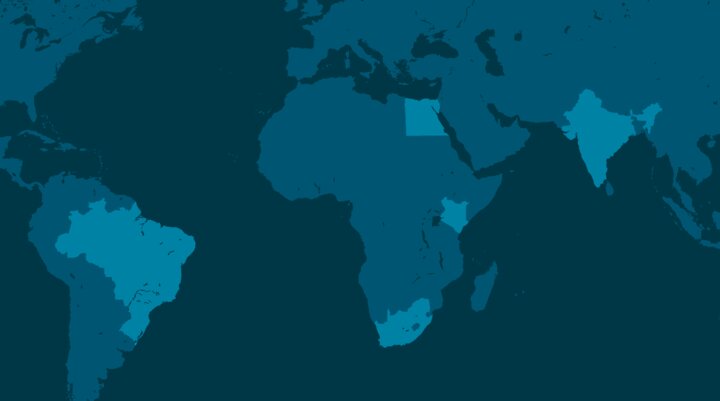Bridging the career-advancement opportunity gap for women researchers in LMICs
by the Livestock Vaccine Innovation Fund, International Development Research Centre, Canada
The mentorship opportunity gap for women from LMICs
Women researchers from low- and middle-income countries (LMICs) face a big mentorship opportunity gap. In the 2018 IVVN member survey, nearly half of the women from LMICs who participated listed a lack of mentoring opportunities as one of their greatest professional challenges. In contrast, not a single male respondent from a high-income country reported this to be a challenge. This finding motivated the IVVN, in partnership with Canada’s International Development Research Centre, to develop a mentoring fellowship programme specifically for female researchers in LMICs.
The underrepresentation of women from LMICs in scientific research, especially in senior academic positions, is a consequence of unevenly distributed opportunities for career advancement. In turn, this results in a lack of gender parity and LMIC representation on boards, expert review panels and other forums that influence and shape entire fields of research.
Respondents who described a lack of mentoring opportunities as a barrier, weighted by gender and by the World Bank income levels of the countries where respondents work (low- and middle income countries, LMICs, and high-income countries, non-LMICs).
What is keeping women from LMICs from accessing career advancement opportunities?
Many factors play into the lack of career advancement opportunities, both for researchers in LMICs and for women, and these are compounded for women from LMICs.
Mentoring, especially in a formalised sense, is an infrequent and largely unsupported practice in many LMICs institutions. 'Best practices' for successful mentorship programmes generally do not provide a good template for LMIC institutions, since these are developed for and by high-income country institutions and researchers where opportunities are plentiful; institutions are well-resourced; and a variety of professionals from different backgrounds are trained, supported and rewarded for engaging in mentorship.
In the field of global health research, studies show that in LMICs, few people are available to be good mentors, and potential mentors lack support from their institutions in terms of training and recognition. Young scientists in Africa report that a lack of mentorship opportunities hinders their career progression, and emphasise the need for more guidance on networking, navigating career decisions and applying for funding.
Young scientists in Africa lack mentorship on fundraising, career decisions and networking

The percentage of scientists ages 39 or younger surveyed by Beaudry, Mouton & Prozesky indicating that they have never or rarely received mentoring on specific issues listed. From "The Next Generation of Scientists in Africa" published in 2018.
But even where career-advancement opportunities are available to researchers in LMICs, their design can discourage the full participation of women. For instance, programmes for early-career scientists with an age cap can exclude women who have taken a few years away from their career to start a family, care for children or engage in caregiving activities that are often relegated to women. Women may also not fully benefit from programmes whose design does not consider sociocultural factors that may influence women’s mobility, use of time, or ability to challenge and navigate existing hierarchies.
The IVVN Fellowship Programme
The recently launched IVVN Fellowship Programme directly addresses the mentorship opportunity gap and aims to provide a boost to the careers of the six female researchers in LMICs who were selected as fellows. Each Fellow can receive up to £50,000 to work on a project that addresses key bottlenecks to developing vaccines against animal diseases. This funding can be used towards the research – for example for laboratory equipment or bench fees – and towards professional development, including attending conferences and workshops, or as a stipend for the fellow.
The six 2021 IVVN Fellows. Top row (L–R): Dr Mercy Yvonne Akinyi, Dr Amany Hassan and Dr Sreeja Lakshmi; bottom row (L–R): Dr Angela Makumi, Dr Laura Oliveira and Dr Tanja Smith.
The fellowship provides meaningful opportunities for international collaboration, which is shown to be an essential ingredient to the success of influential researchers from LMICs. Each fellow receives support from two mentors, one based in a different country and one based in her local institution, who can provide support and advice to guide her research and her career. As part of a cohort, fellows will also have the opportunity to network with one another.
This fellowship, funded in part by the Livestock Vaccine Innovation Fund (LVIF)¹, is part of a set of projects focused on meaningfully increasing women’s participation in livestock value chains. Together, these projects focus on empowering women at every node of the livestock vaccine value chain, from livestock keepers and animal service providers in the field, through to the lab and the boardroom.
Wider benefits
While the fellowship is designed to help early-career female researchers in LMICs to gain experience, build their capacities and advance their careers, the potential benefits extend to their home institutions and to the field of veterinary vaccine science. High-profile researchers increase the visibility of their home institutions, and this “halo effect” can help these institutions achieve global renown for the high-quality research conducted by these researchers.
The promise of the 2030 Sustainable Development Agenda is “Leave no one behind”. No country can afford to leave behind half of its population. As more women in LMICs are encouraged and enabled to advance in their careers, they can contribute to shaping the future of the field of veterinary vaccinology, bringing with them a greater diversity of thought and experience. In turn, they may make the field more accessible for a next generation of diverse leaders and experts.
1 - The Livestock Vaccine Innovation Fund (LVIF) is a CAD57 million initiative funded by the Bill & Melinda Gates Foundation, Global Affairs Canada and IDRC for the development, production, commercialization of vaccines against neglected livestock and zoonotic diseases in sub-Saharan Africa, South and South East Asia.


